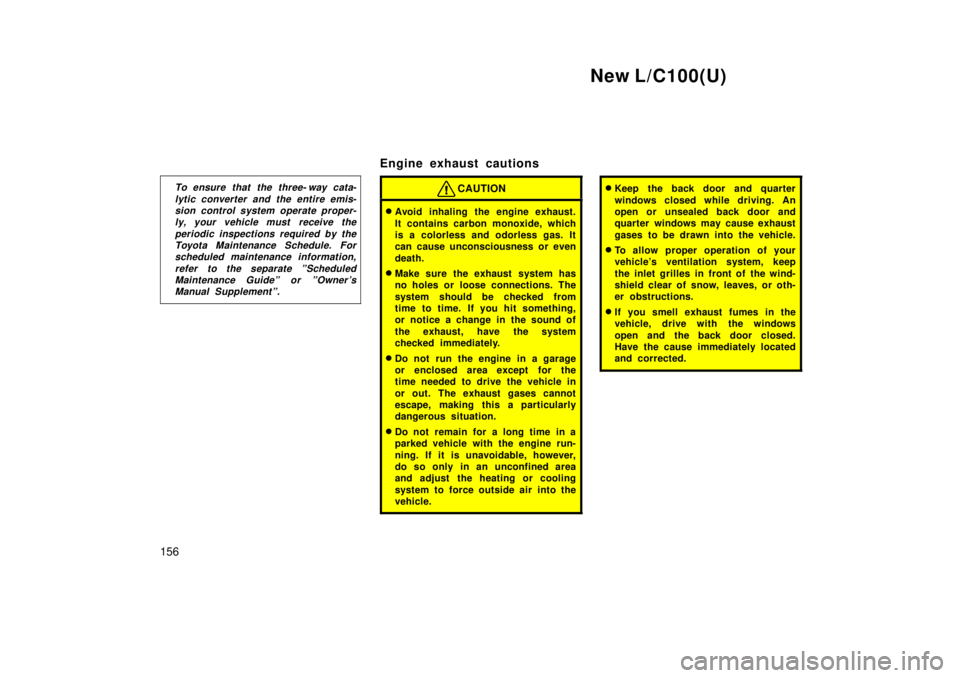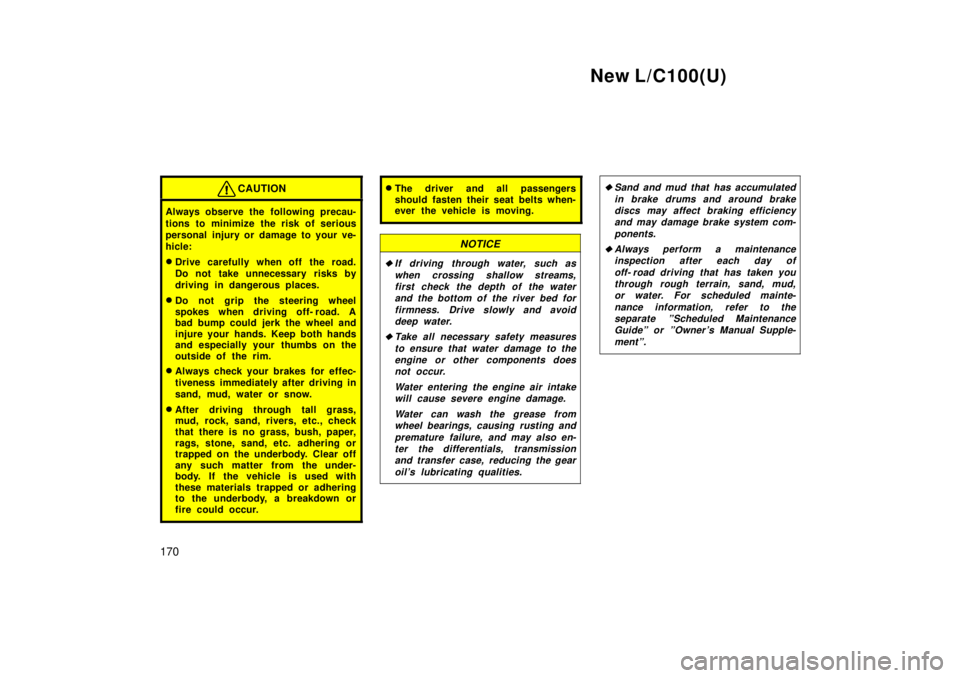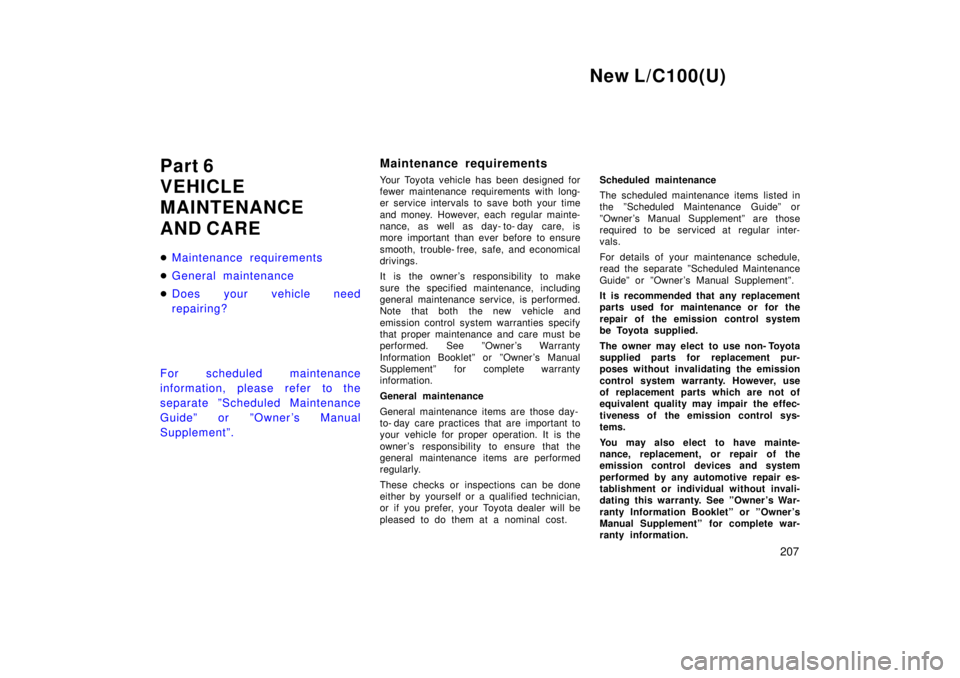1999 TOYOTA LAND CRUISER maintenance
[x] Cancel search: maintenancePage 145 of 202

New L/C100(U)153
Fuel
FUEL TYPE
Your new vehicle must use only un-
leaded gasoline.
To help prevent gas station mix- ups, your
Toyota has a new smaller fuel tank open-
ing. The special nozzle on pumps with
unleaded fuel will fit it, but the larger
standard nozzle on pumps with leaded gas
will not.
At a minimum, the gasoline you use
should meet the specifications of ASTM
D4814 in the U.S.A. and CGSB 3.5- M93
in Canada.
NOTICE
Do not use leaded gasoline. Use of
leaded gasoline will cause the three-way catalytic converter to lose its ef-
fectiveness, the emission control sys-
tem to function improperly, and dam-age to the engine. Also, this can in-crease maintenance costs.
OCTANE RATING
Select Octane Rating 91 (Research Oc-
tane Number 96) or higher for optimum
engine performance. However, if such
premium type cannot be obtained, you
may temporarily use unleaded gasoline
with an Octane Rating as low as 87
(Research Octane Number 91).
Use of unleaded gasoline with an octane
rating or research octane number lower
than stated above will cause persistent
heavy knocking. If it is severe, this will
lead to engine damage.
If your engine knocks...
If you detect heavy knocking even when
using the recommended fuel, or if you
hear steady knocking while holding a
steady speed on level roads, consult your
Toyota dealer.
However, now and then, you may notice
light knocking for a short time while accel-
erating or driving up hills. This is no need
of concern. GASOLINES CONTAINING DETERGENT
ADDITIVES
Toyota recommends use of gasolines
that contain detergent additives to
avoid build- up of engine deposits.
For further details, ask your Toyota dealer
or a local gasoline retailer.
IMPROVED GASOLINES
The American Automobile Manufacturers
Association (AAMA) has developed a
specification of improved gasolines. The
AAMA specification offers optimal fuel
information for better vehicle perfor-
mance and better protection of your en-
gine.
Toyota recommends the use of gasolines
that meet the AAMA specification, if avail-
able, for improved driveability and emis-
sion control system.
GASOLINES CONTAINING MTBE
Gasolines that contain MTBE (Methyl
Tertiary- Butyl Ether) are available in the
market. If you use a gasoline mixed
with MTBE, make certain that it does
not contain more than 15% of MTBE.
Page 148 of 202

New L/C100(U)
156
To ensure that the three- way cata- lytic converter and the entire emis-sion control system operate proper- ly, your vehicle must receive the
periodic inspections required by theToyota Maintenance Schedule. Forscheduled maintenance information,
refer to the separate ºScheduledMaintenance Guideº or ºOwner's
Manual Supplementº.
Engine exhaust cautions
CAUTION
� Avoid inhaling the engine exhaust.
It contains carbon monoxide, which
is a colorless and odorless gas. It
can cause unconsciousness or even
death.
� Make sure the exhaust system has
no holes or loose connections. The
system should be checked from
time to time. If you hit something,
or notice a change in the sound of
the exhaust, have the system
checked immediately.
� Do not run the engine in a garage
or enclosed area except for the
time needed to drive the vehicle in
or out. The exhaust gases cannot
escape, making this a particularly
dangerous situation.
� Do not remain for a long time in a
parked vehicle with the engine run-
ning. If it is unavoidable, however,
do so only in an unconfined area
and adjust the heating or cooling
system to force outside air into the
vehicle.
�Keep the back door and quarter
windows closed while driving. An
open or unsealed back door and
quarter windows may cause exhaust
gases to be drawn into the vehicle.
� To allow proper operation of your
vehicle's ventilation system, keep
the inlet grilles in front of the wind-
shield clear of snow, leaves, or oth-
er obstructions.
� If you smell exhaust fumes in the
vehicle, drive with the windows
open and the back door closed.
Have the cause immediately located
and corrected.
Page 149 of 202

New L/C100(U)157
FUNCTIONS OF ENGINE OIL
Engine oil has the primary functions of
lubricating and cooling the inside of the
engine, and plays a major role in main-
taining the engine in proper working order.
ENGINE OIL CONSUMPTION
It is normal that an engine should con-
sume some engine oil during normal
engine operation. The causes of oil
consumption in a normal engine are as
follows.
� Oil is used to lubricate pistons, piston
rings and cylinders. A thin film of oil
is left on the cylinder wall when a pis-
ton moves downwards in the cylinder.
High negative pressure generated when
the vehicle is decelerating sucks some
of this oil into the combustion chamber.
This oil as well as some part of the oil
film left on the cylinder wall is burned
by the high temperature combustion
gases during the combustion process. �
Oil is also used to lubricate the stems
of the intake valves. Some of this oil
is sucked into the combustion chamber
together with the intake air and is
burned along with the fuel. High tem-
perature exhaust gases also burn the
oil used to lubricate the exhaust valve
stems.
The amount of engine oil consumed de-
pends on the viscosity of the oil, the
quality of the oil and the conditions the
vehicle is driven under.
More oil is consumed by high- speed driv-
ing and frequent acceleration and decel-
eration.
A new engine consumes more oil, since
its pistons, piston rings and cylinder walls
have not become conditioned.
When judging the amount of oil con-
sumption, note that the oil may become
diluted and make it difficult to judge
the true level accurately. As an example, if a vehicle is used for
repeated short trips, and consumes a nor-
mal amount of oil, the dipstick may not
show any drop in the oil level at all, even
after 1000 km (600 miles) or more. This
is because the oil is gradually becoming
diluted with fuel or moisture, making it
appear that the oil level has not changed.
The diluting ingredients evaporate out
when the vehicle is then driven at high
speeds, as on an expressway, making it
appear that oil is excessively consumed
after driving at high speeds.
IMPORTANCE OF ENGINE OIL LEVEL CHECK
One of the most important points in prop-
er vehicle maintenance is to keep the en-
gine oil at the optimum level so that oil
function will not be impaired. Therefore, it
is essential that the oil level be checked
regularly. Toyota recommends that the oil
level be checked every time you refuel
the vehicle.
NOTICE
Failure to check the oil level regularly
could lead to serious engine troubledue to insufficient oil.
Facts about engine oil
consumption
Page 162 of 202

New L/C100(U)
170
CAUTION
Always observe the following precau-
tions to minimize the risk of serious
personal injury or damage to your ve-
hicle: � Drive carefully when off the road.
Do not take unnecessary risks by
driving in dangerous places.
� Do not grip the steering wheel
spokes when driving off- road. A
bad bump could jerk the wheel and
injure your hands. Keep both hands
and especially your thumbs on the
outside of the rim.
� Always check your brakes for effec-
tiveness immediately after driving in
sand, mud, water or snow.
� After driving through tall grass,
mud, rock, sand, rivers, etc., check
that there is no grass, bush, paper,
rags, stone, sand, etc. adhering or
trapped on the underbody. Clear off
any such matter from the under-
body. If the vehicle is used with
these materials trapped or adhering
to the underbody, a breakdown or
fire could occur.
�The driver and all passengers
should fasten their seat belts when-
ever the vehicle is moving.
NOTICE
�If driving through water, such as
when crossing shallow streams,first check the depth of the water
and the bottom of the river bed for
firmness. Drive slowly and avoiddeep water.
�Take all necessary safety measures
to ensure that water damage to theengine or other components doesnot occur.
Water entering the engine air intakewill cause severe engine damage.
Water can wash the grease fromwheel bearings, causing rusting and
premature failure, and may also en-ter the differentials, transmissionand transfer case, reducing the gear
oil's lubricating qualities.
�Sand and mud that has accumulatedin brake drums and around brakediscs may affect braking efficiencyand may damage brake system com-
ponents.
�Always perform a maintenanceinspection after each day of
off- road driving that has taken youthrough rough terrain, sand, mud, or water. For scheduled mainte-
nance information, refer to theseparate ºScheduled Maintenance Guideº or ºOwner 's Manual Supple-
mentº.
Page 168 of 202

New L/C100(U)
176
TIRES
� Ensure that your vehicle's tires are
properly inflated. Adjust the tire pres-
sure indicated below:
Tire pressure, kPa (kgf/cm 2
or bar, psi)
Front 220 (2.2, 32)
Rear 240 (2.4, 35)
� The trailer tires should be inflated to
the pressure recommended by the trail-
er manufacturer in respect to the total
trailer weight.
TRAILER LIGHTS � Trailer lights must comply with federal,
state/provincial and local regulations.
See your local recreational vehicle
dealer or rental agency for the correct
type of wiring and relays for your trail-
er. Check for correct operation of the
turn signals and stop lights each time
you hitch up. Direct splicing may dam-
age your vehicle's electrical system
and cause a malfunction of your lights.
BREAK- IN SCHEDULE
� Toyota recommends that you do not
tow a trailer with a new vehicle or a
vehicle with any new power train com-
ponent (engine, transmission, differen-
tial, wheel bearing, etc.) for the first
800 km (500 miles) of driving. MAINTENANCE
� If you tow a trailer, your vehicle will
require more frequent maintenance due
to the additional load. For this
information, please refer to the
scheduled maintenance information in
the ºScheduled Maintenance Guideº or
ºOwner 's Manual Supplementº.
� Retighten all fixing bolts of the towing
ball and bracket after approximately
1000 km (600 miles) of trailer driving.
PRE- TOWING SAFETY CHECK � Check that your vehicle remains level
when a loaded or unloaded trailer is
hitched. Do not drive if the vehicle has
an abnormal nose- up or nose- down
condition, and check for improper
tongue load, overload, worn suspension
or other possible causes.
� Make sure the trailer cargo is securely
loaded so that it cannot shift.
� Check that your rear view mirrors con-
form to any applicable federal, state/
provincial or local regulation. If not,
install the rear view mirrors required
for towing purpose. TRAILER TOWING TIPS
When towing a trailer, your vehicle will
handle differently than when not tow-
ing. The three main causes of vehicle-
trailer accidents are driver error, exces-
sive speed and improper trailer loading.
Keep these in mind when towing:
� Before starting out, check operation of
the lights and all vehicle- trailer connec-
tions. After driving a short distance,
stop and recheck the lights and con-
nections. Before actually towing a trail-
er, practice turning, stopping and back-
ing with a trailer in an area away from
traffic until you learn the feel.
� Because stopping distance may be in-
creased, vehicle- to- vehicle distance
should be increased when towing a
trailer. For each 16 km/h (10 mph) of
speed, allow at least one vehicle and
trailer length between you and the ve-
hicle ahead. Avoid sudden braking as
you may skid, resulting in jackknifing
and loss of control. This is especially
true on wet or slippery surfaces.
Page 171 of 202

New L/C100(U)179
�
Avoid continuous speeding up and
slowing down. Stop- and- go driving
wastes fuel.
� Avoid unnecessary stopping and
braking. Maintain a steady pace. Try
to time the traffic signals so you only
need to stop as little as possible or
take advantage of through streets to
avoid traffic lights. Keep a proper dis-
tance from other vehicles to avoid
sudden braking. This will also reduce
wear on your brakes.
� Avoid heavy traffic or traffic jams
whenever possible.
� Do not rest your foot on the brake
pedal. This causes needless wear,
overheating and poor fuel economy.
� Maintain a moderate speed on high-ways. The faster you drive, the great-
er the fuel consumption. By reducing
your speed, you will cut down on fuel
consumption.
� Keep the front wheels in proper
alignment. Avoid hitting the curb and
slow down on rough roads. Improper
alignment not only causes faster tire
wear but also puts an extra load on
the engine, which, in turn, wastes fuel. �
Keep the bottom of your vehicle free
from mud, etc. This not only lessens
weight but also helps prevent corro-
sion.
� Keep your vehicle tuned- up and in
top shape. A dirty air cleaner, improp-
er valve clearance, dirty plugs, dirty oil
and grease, brakes not adjusted, etc.
all lower engine performance and con-
tribute to poor fuel economy. For longer
life of all parts and lower operating
costs, keep all maintenance work on
schedule, and if you often drive under
severe conditions, see that your vehicle
receives more frequent maintenance
(For scheduled maintenance informa-
tion, please refer to the separate
ºScheduled Maintenance Guideº or
ºOwner 's Manual Supplementº).
CAUTION
Never turn off the engine to coast
down hills. Your power steering and
brake booster will not function with-
out the engine running. Also, the
emission control system operates
properly only when the engine is run-
ning.
Page 179 of 202

New L/C100(U)207
Part 6
VEHICLE
MAINTENANCE
AND CARE �
Maintenance requirements
�General maintenance
�Does your vehicle need
repairing?
For scheduled maintenance
information, please refer to the
separate ºScheduled Maintenance
Guideº or ºOwner 's Manual
Supplementº.
Maintenance requirements
Your Toyota vehicle has been designed for
fewer maintenance requirements with long-
er service intervals to save both your time
and money. However, each regular mainte-
nance, as well as day- to- day care, is
more important than ever before to ensure
smooth, trouble- free, safe, and economical
drivings.
It is the owner 's responsib ility to make
sure the specified maintenance, including
general maintenance service, is performed.
Note that both the new vehicle and
emission control system warranties specify
that proper maintenance and care must be
performed. See ºOwner 's Warranty
Information Bookletº or ºOwner 's Manual
Supplementº for complete warranty
information.
General maintenance
General maintenance items are those day-
to- day care practices that are important to
your vehicle for proper operation. It is the
owner 's responsib ility to ensure that the
general maintenance items are performed
regularly.
These checks or inspections can be done
either by yourself or a qualified technician,
or if you prefer, your Toyota dealer will be
pleased to do them at a nominal cost. Scheduled maintenance
The scheduled maintenance items listed in
the ºScheduled Maintenance Guideº or
ºOwner 's Manual Supplementº are those
required to be serviced at regular inter-
vals.
For details of your maintenance schedule,
read the separate ºScheduled Maintenance
Guideº or ºOwner 's Manual Supplementº.
It is recommended that any replacement
parts used for maintenance or for the
repair of the emission control system
be Toyota supplied.
The owner may elect to use non- Toyota
supplied parts for replacement pur-
poses without invalidating the emission
control system warranty. However, use
of replacement parts which are not of
equivalent quality may impair the effec-
tiveness of the emission control sys-
tems.
You may also elect to have mainte-
nance, replacement, or repair of the
emission control devices and system
performed by any automotive repair es-
tablishment or individual without invali-
dating this warranty. See ºOwner's War-
ranty Information Bookletº or ºOwner's
Manual Supplementº for complete war-
ranty information.
Page 180 of 202

New L/C100(U)
208
Where to go for service?
Toyota technicians are well- trained spe-
cialists and are kept up to date with the
latest service information through technical
bulletins, service tips, and in- dealership
training programs. They learn to work on
Toyotas before they work on your vehicle,
rather than while they are working on it.
You can be confident that your Toyota
dealer 's service department performs the
best job to meet the maintenance require-
ments on your vehicle±reliably and eco-
nomically.
Your copy of the repair order is proof that
all required maintenance has been per-
formed for warranty coverage. And if any
problems should arise with your vehicle
while under warranty, your Toyota dealer
will promptly take care of it. Again, be
sure to keep a copy of the repair order
for any service performed on your Toyota.
What about do- it- yourself maintenance?
Many of the maintenance items are easy
to do yourself if you have a little mechani-
cal ability and a few basic automotive
tools. Simple instructions for how to per-
form them are presented in Part 7.
If you are a skilled do- it- yourself
mechanic, the Toyota service manuals are
recommended. Please be aware that
do- it- yourself maintenance can affect your
warranty coverage. See ºOwner 's Warranty
Information Bookletº or ºOwner 's Manual
Supplementº for the details.
General maintenance
Listed below are the general maintenance
items that should be performed as fre-
quently as specified. In addition to check-
ing the items listed, if you notice any
unusual noise, smell or vibration, you
should investigate the cause or take your
vehicle to your Toyota dealer or a quali-
fied service shop immediately. It is recom-
mended that any problem you notice be
brought to the attention of your dealer or
the qualified service shop for their advice.
CAUTION
Make these checks only where ade-
quate ventilation can be obtained if
you run the engine.
OUTSIDE THE VEHICLE
Items listed below should be performed
from time to time, unless otherwise
specified.
Tire pressure
Check the pressure with a gauge every
two weeks, or at least once a month. See
Chapter 7- 2 for additional information.